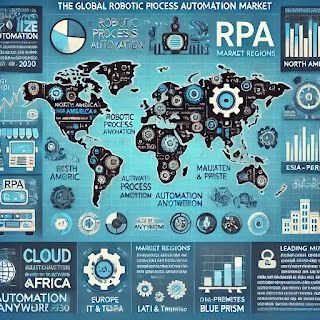Market Size and Growth Rate:
- The global RPA market was valued at around USD 2.94 billion in 2023 and is expected to reach USD 30.85 billion by 2030, with a compound annual growth rate (CAGR) of 39.9% from 2023 to 2030. Another source estimates the market size to reach USD 14.75 billion by 2029, growing at a CAGR of 29.7% during the forecast period (Grand View Research) (Mordor Intel) (Grand View Research).
Regional Insights:
- North America: This region holds a significant share of the RPA market, driven by high adoption rates among government agencies and enterprises. The market is expected to continue growing rapidly due to the strong penetration of automation solutions (Strategic Market Research).
- Asia-Pacific: This region is expected to witness the highest growth rate, with a CAGR of 42% from 2023 to 2030. The increasing adoption of RPA across various industries, such as IT, healthcare, telecom, and manufacturing, is fueling this growth (Strategic Market Research) (Grand View Research).
Industry Applications:
- The BFSI (Banking, Financial Services, and Insurance) sector is one of the largest adopters of RPA, utilizing it for automating processes like credit evaluation, account reconciliation, and fraud protection. This sector held a market share of around 31.22% in 2022 (Strategic Market Research).
- Other significant industries include healthcare, retail, manufacturing, and IT & telecom, all of which are increasingly adopting RPA to improve efficiency and reduce costs (Grand View Research) (Grand View Research).
Deployment Models:
- On-premises deployments have been dominant due to the need for businesses to align RPA access policies with in-house protocols and ensure data security.
- Cloud-based RPA solutions are growing rapidly, driven by lower infrastructure costs, automatic upgrades, and ease of deployment. The cloud segment is expected to grow at a high CAGR during the forecast period (Grand View Research) (Grand View Research).
Technological Advancements:
- RPA technology is increasingly being integrated with artificial intelligence (AI) and machine learning (ML) to handle more complex tasks and enhance decision-making processes. Innovations like Automation Anywhere’s generative AI platform and UiPath’s Automation Cloud Robots are examples of how AI is being incorporated to expand RPA capabilities (Mordor Intel) (Data Bridge Market Research).
In summary, the RPA market is set for substantial growth, driven by technological advancements, increased adoption across various industries, and the expansion of cloud-based solutions. The market's growth trajectory indicates a strong future for RPA as businesses continue to seek ways to improve efficiency and reduce costs.
Market Leadership and Growth in RPA


